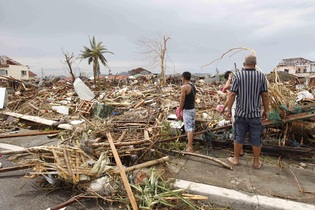 Damages from Typhoon Haiyan in the Philippines in 2013 http://thenypost.files.wordpress.com/2013/11/philippines-typhoon_.jpg?w=680&h=450&crop=1 Damages from Typhoon Haiyan in the Philippines in 2013 http://thenypost.files.wordpress.com/2013/11/philippines-typhoon_.jpg?w=680&h=450&crop=1 My time here at the COP has been just crazy. This whole experience is so overwhelming; there is so much to see and do at any given moment at the conference. There are countless side talks, covering a wide variety of topics and perspectives from different countries. I've heard presentations from third world countries, Indonesia, the European Union, Saudi Arabia, Japan, among so many others! There is an amazing amount of information to take in here, and it is great to see what is going on with other countries and other organizations and their approach on how to tackle the massive problem of climate change. From this conference, my eyes have been opened to several issues I had never considered, namely adaptation. Often, I've thought that the effects of climate change would only affect us in the distant future. I have never considered the fact that countries are being affected right now. As I'm writing this post, the super typhoon Hagupit is heading for the Philippines. The Philippines have been experiencing detrimental typhoons, and the frequency and strength of these storms is increasing, as a result of climate change. Africa has been seeing some of the largest effects, as temperature changes affect them threefold compared to the global average. They are seeing an increasing amount of floods and landslides. Cases of vector-borne diseases, like malaria, are rapidly increasing. The increase of temperature is harming some of their temperature-sensitive crops by decreasing their planting periods. This hurts the countries’ economic growth, decreases their already short supply of food, and it becomes increasingly difficult for them to recover as time passes and conditions worsen. Countries already have to adapt to the effects of climate change, which is especially difficult for countries who cannot provide basic human needs to their nations as it is. So if you've heard about the significant donation that President Obama pledged to the Green Climate Fund, adaptation is one of the focuses of that fund. Developed countries donate to the Green Climate Fund in order to help developing countries with climate change adaptation projects as well as to help them develop sustainable practices. That fund serves a noble purpose, as developed countries hold a vast majority of the fault due to their incredible amount of carbon pollution over the years. -Barry Hartweg
2 Comments
Chris B.
5/12/2014 06:25:54 am
very insightfu
Reply
Sonya L
5/12/2014 09:19:06 pm
Great job Barry. Very proud of you and your efforts.
Reply
Leave a Reply. |
Categories
All
Archives
March 2024
|
 RSS Feed
RSS Feed
